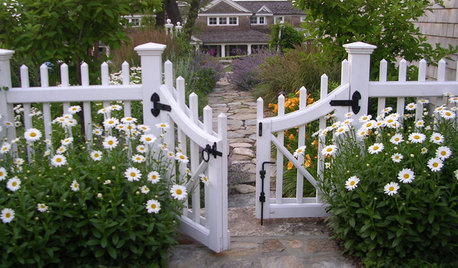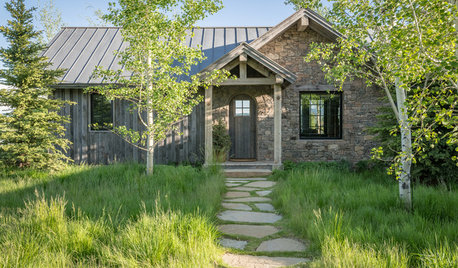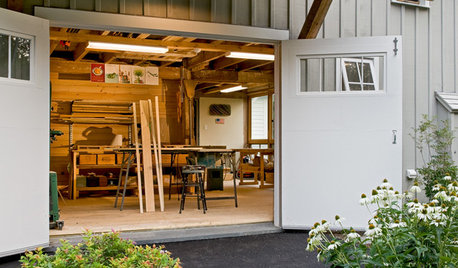Elder Care and the stresses it creates (long)
ldstarr
6 years ago
Featured Answer
Sort by:Oldest
Comments (105)
Related Discussions
My mother had stroke, what are choices for care (long)
Comments (13)Ilook at nursing homes just as my parents did - last stop before I die. Nothing positive about it. I have been in different nursing homes and couldn't wait to leave. Nothing cheery about them. Very depressing to me and God help those that have to live there. Most nursing homes are shorthanded and do not pay a good wage to attract quality personnel. You might want to check with her doctor about the prose for physical therapy now. If it would be beneficial, he can write an order or prescription for it. There are agencies that transport the elderly to appointments like this. The dept of Human Resources may be able to give you some insight. Medicare only pays for nursing home care for a short period of time. Then you pay if you have the funds or if not much money or assets, you could qualify for medicaid. THEY take all assets. If you sell the house, they get that too. Would it be feasable to sell the house and car as she won't be driving, put that with her savings and look into a retirement home where they do have assistance. Some have a RN on duty at all times, provide transportation and offer other ammenities. I understand it's like an apartment where they don't have to get rid of their personal belongings unless maybe just too much furniture. In Assisted living, the person has to be able to care for themselves. It is normally one room for the living rm, bedroom, and eating area. The kitchen is very small with a small fridge and a microwave. This means most of the personal belongings have to go. I don't understand why arrangements have to be made for her friend too. Does he have a family? Does he have money set aside like your mother? Has he helped with expenses or has been being taken care of? You don't need to answer those questions to me. It is none of my business but if it were my mother's situation, I'd do what is best for her but give him time to make arrangements. If the law in your state recognizes common law marriage and by what standards, you will have more to deal with. The doctor placed my mother in a nursing home with my brother's approval. Momma is very unhappy. I'm looking into Elder Care at home as that's where she wants to be. I guess I look at it that mother's make sacrifices of all kinds in raising us. They have THEIR home, THEIR friends and THEIR way of life. It's just so sad to take all that away. I wish you the very best as I understand completely how heartwrenching the decisions are and sometimes the tears seem endless because it is Momma and we love them so. Lynn...See Moreelder law and estates
Comments (5)My situation is a little bit different from yours, but I think the division of assets should have been done when the person entered the home. I live in Kansas, but medicaid is a federal service so am assuming it will be the same everywhere. I talked to an SRS rep today about care homes, medicaid and the division of assest and this is what I found out. If/when I put my husband in a care home, I will pay the first months bill. Then I will go to the SRS taking in proof of our financial resources. I will then fill out a medicaid form and will learn how much of our assets will be for my husband and how much income for me. The money will all be left in my control, I will pay the nursing home bill and when I spend down to a certain amount medicaid will step in and take over my husbands expenses. I read in the paper about Medicaid was thinking of putting liens on the spouse's home to recover their expenses. I was concerned about that. I question the SRS rep and he said that has not taken affect yet. I mentioned I might need money and have a need to buy a cheaper home so I would have money to live on. He said in that event the lien would be signed off and likely be put on the next home I buy. I was much relieved talking to the rep because I have gotten to the point I need some R&R, if I don't get it, my husband will have to go to a care home. I have already had some stress problems health wise....See MoreHealth Reform's Long-Term Care Option
Comments (3)Sorry - a little more info to be added: (IÂm a believer itÂs best to get a private policy before one turns 50 [most carriers will not write an LTC policy on anyone younger than 45] as the premiums start to rise substantially after that age. As the first article states, the premiums for the CLASS program are not much cheaper than a Preferred risk would pay for a much better private LTC policy if purchased at age 50 or younger. Our own policies (purchased thru DH's employer 10 yrs ago) are miles better than the CLASS program offers, but if we tried to obtain these same policies now, weÂd either get turned down or have to pay three or four times more than what we currently pay.) Further info: Article: With Health Reform, Long-Term-Care Option Becomes Law CLASS Act enacted with health care reform 3/24/2010 By Stephen Miller Under the CLASS Act program, all premium costs can be charged to employees. Employers who chose to participate in the CLASS program wil be required to permit employees to make contributions by means of a payroll deduction, once the CLASS Independence Benefit Plan is designated by U. S. Department of Health and Human Services (HHS), which is to be no later than Oct. 1, 2012. Employers either would create automatic enrollment procedures that allow workers to opt out, or allow workers to choose to enroll and pay premiums. Participants must pay monthly premiums for at least five years before they could receive benefits. Seniors (over age 65 years old) who have paid premiums for at least 20 years and are not actively employed are exempt from paying any premium increase. Premium payments will be placed in a "Life Independence Account" on behalf of each eligible beneficiary and managed by the U.S. Department of Health and Human Services as a new insurance program. As the CLASS program is developed, participating employers will need to coordinate with their payroll services providers to facilitate these deductions and contributions. The Congressional Budget Office estimates that the monthly insurance premium will average about $123 in 2011. Premiums vary with age and will not increase once employees signed up, but they would increase for those signing up later. After five years of paying into the program, enrollees who continue to pay monthly premiums would become eligible for assistance if they experience limitations in two or more so-called activities of daily living, including eating, bathing, dressing and taking medications. This assistance would take the form of a modest daily cash benefit, estimated at $50 per day for impaired enrollees living in the community, for services such as respite care, home care aides and accessible transportation, and up to $75 a day for enrollees who become institutionalized. These amounts would increase with inflation. Here is a link that might be useful: Earlier info on CLASS program...See MoreFungal disease creating drought stress in zoysia?
Comments (8)Thatch is a build-up of organic matter which can include, dead grass leaves, stems, stolons, rhizomes, and overcrowded grass roots and lateral weed growth (Wikipedia). I can live with that definition. Key is build-up. You have one layer of fallen over dead grass. I don't think that meets the definition. I guess when I rake up the leaves I'm dethatching. Have you tried raking up the dead grass? The reason not to use a mechanical dethatcher is it is abusive to the turf. If you have stolons it will chop them into pieces. For St Augustine that can kill the plant. Zoysia is mostly spread with rhizomes, so you would not see it, but with a rake you can be a lot more selective as to how much of a beating the turf gets....See MoreUser
6 years agolast modified: 6 years agoElmer J Fudd
6 years agolast modified: 6 years agoraee_gw zone 5b-6a Ohio
6 years agochisue
6 years agolast modified: 6 years agoUser
6 years agoUser
6 years agoUser
6 years agoElmer J Fudd
6 years agolast modified: 6 years agoUser
6 years agomojomom
6 years agoElmer J Fudd
6 years agolast modified: 6 years agoUser
6 years agoElmer J Fudd
6 years agolast modified: 6 years agoldstarr
6 years agoUser
6 years agoPKponder TX Z7B
6 years agoElmer J Fudd
6 years agolast modified: 6 years agoHareball
6 years agoPKponder TX Z7B
6 years agoHareball
6 years agoElmer J Fudd
6 years agochisue
6 years agolast modified: 6 years agoblfenton
6 years agochisue
6 years agosushipup1
6 years agonickel_kg
6 years agolast modified: 6 years agochisue
6 years agolast modified: 6 years ago
Related Stories

REMODELING GUIDESHow to Care for Pets and Children During a Remodel
These strategies can help protect animals and children from hazardous materials, construction areas and stress
Full Story
DECORATING GUIDESDivide and Conquer: How to Furnish a Long, Narrow Room
Learn decorating and layout tricks to create intimacy, distinguish areas and work with scale in an alley of a room
Full Story
GARDENING GUIDESHow to Maintain Your Garden to Ensure Its Long-Term Health
Experts weigh in on how to keep your plants thriving and your garden looking good for years to come
Full Story
LIFECreate a 'Forever House' Connection
Making beautiful memories and embracing your space can help you feel happy in your home — even if you know you'll move one day
Full Story
CURB APPEAL7 Ways to Create a Neighborly Front Yard
Foster community spirit by setting up your front porch, paths and yard for social interaction
Full Story
KITCHEN DESIGNHow to Create a Joyful, Clutter-Free Kitchen
Give yourself room to cook and relax by assessing how you use your counters, cabinets and corners
Full Story
DENS AND LIBRARIESHow to Care for Your Home Library
Increase your enjoyment of books with these ideas for storing, stacking and displaying them
Full Story
GARDENING GUIDES8 Sustainable, Organic Practices for Greener Lawn Care
Ditch the pesticides and fertilizers and adopt eco-friendly practices that will keep your lawn lush and healthy
Full Story
LIFEStressed Out? Try Hitting the Woodshop
Building things with your hands just might boost your mood while giving you personal new pieces for your home
Full Story
GARDENING GUIDESTree Care: Common Tree Diseases and What to Do About Them
Learn to recognize trees that may be affected by diseases or pests so you can quickly take action
Full Story



bossyvossy